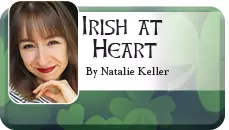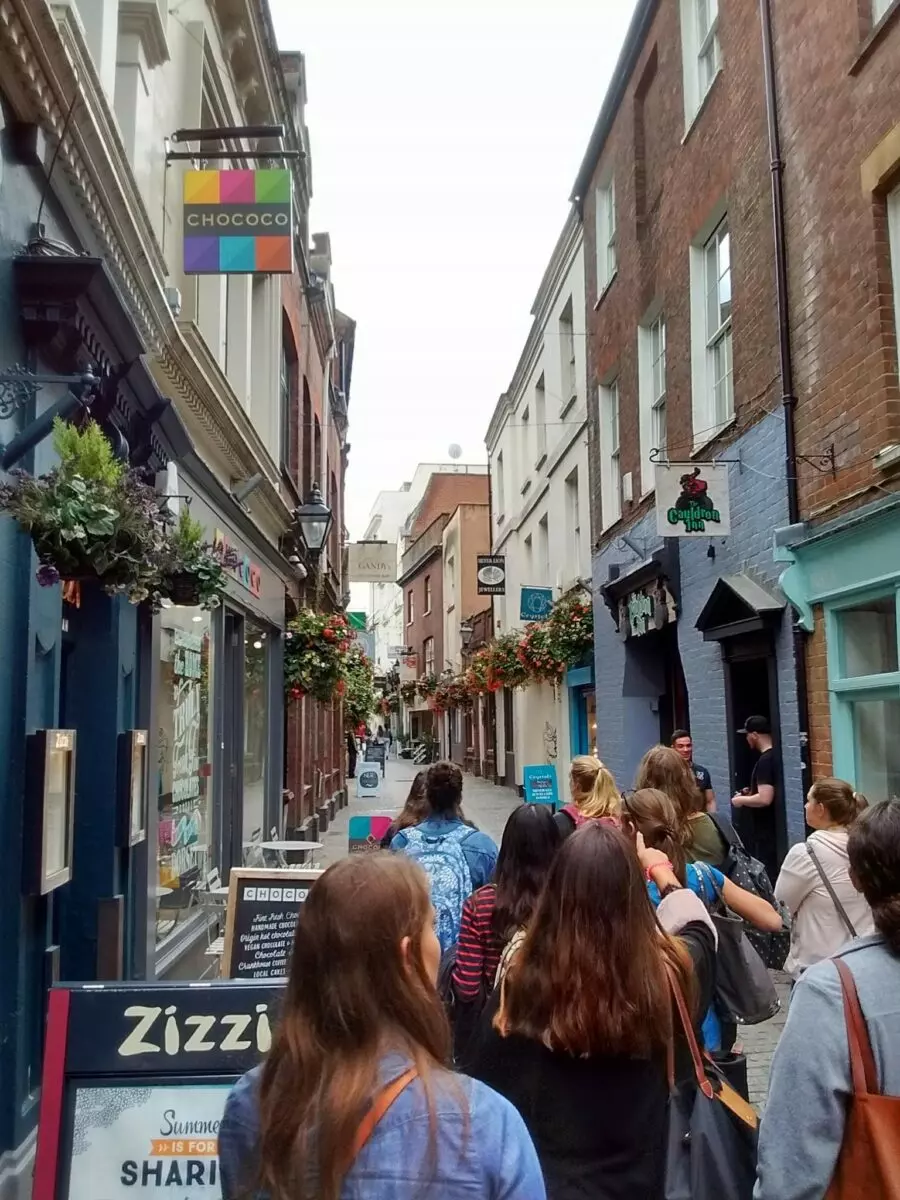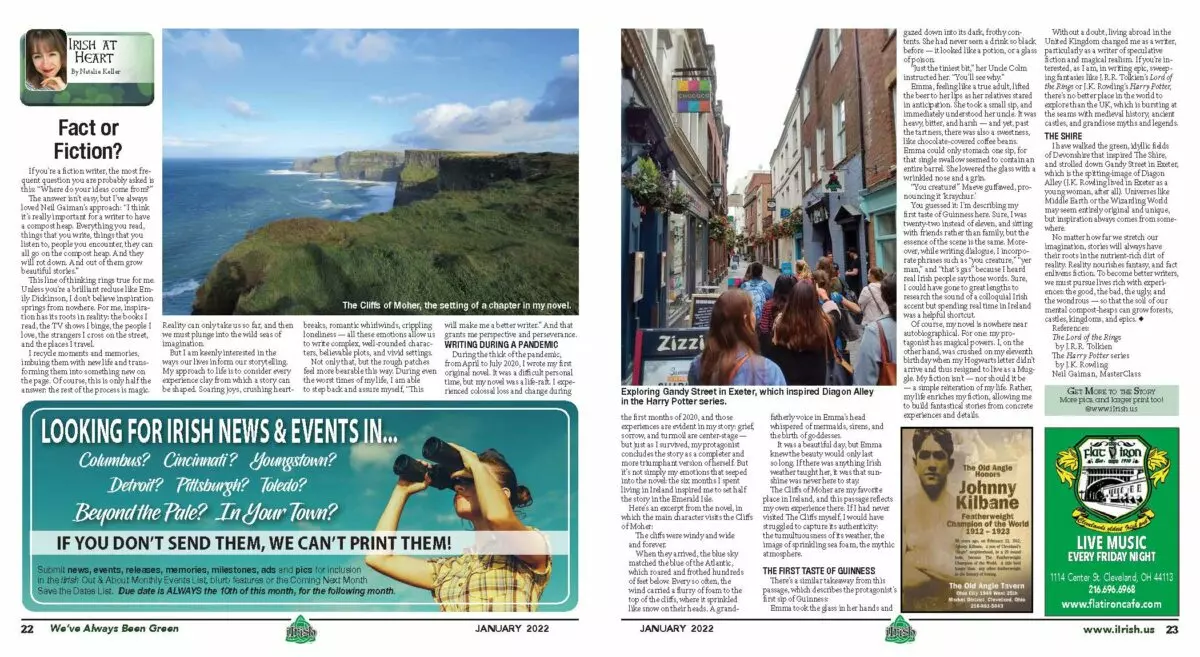
Irish at Heart: Fact or Fiction?
By Natalie Keller
If you’re a fiction writer, the most frequent question you are probably asked is this: “Where do your ideas come from?”
The answer isn’t easy, but I’ve always loved Neil Gaiman’s approach: “I think it’s really important for a writer to have a compost heap. Everything you read, things that you write, things that you listen to, people you encounter, they can all go on the compost heap. And they will rot down. And out of them grow beautiful stories.”
This line of thinking rings true for me. Unless you’re a brilliant recluse like Emily Dickinson, I don’t believe inspiration springs from nowhere. For me, inspiration has its roots in reality: the books I read, the TV shows I binge, the people I love, the strangers I cross on the street, and the places I travel.
I recycle moments and memories, imbuing them with new life and transforming them into something new on the page. Of course, this is only half the answer: the rest of the process is magic. Reality can only take us so far, and then we must plunge into the wild seas of imagination.
But I am keenly interested in the ways our lives inform our storytelling. My approach to life is to consider every experience clay from which a story can be shaped. Soaring joys, crushing heartbreaks, romantic whirlwinds, crippling loneliness — all these emotions allow us to write complex, well-rounded characters, believable plots, and vivid settings.
Not only that, but the rough patches feel more bearable this way. During even the worst times of my life, I am able to step back and assure myself, “This will make me a better writer.” And that grants me perspective and perseverance.

Writing During a Pandemic
During the thick of the pandemic, from April to July 2020, I wrote my first original novel. It was a difficult personal time, but my novel was a life-raft. I experienced colossal loss and change during the first months of 2020, and those experiences are evident in my story: grief, sorrow, and turmoil are center-stage — but just as I survived, my protagonist concludes the story as a completer and more triumphant version of herself. But it’s not simply my emotions that seeped into the novel: the six months I spent living in Ireland inspired me to set half the story in the Emerald Isle.

Here’s an excerpt from the novel, in which the main character visits the Cliffs of Moher:
The cliffs were windy and wide and forever.
When they arrived, the blue sky matched the blue of the Atlantic, which roared and frothed hundreds of feet below. Every so often, the wind carried a flurry of foam to the top of the cliffs, where it sprinkled like snow on their heads. A grandfatherly voice in Emma’s head whispered of mermaids, sirens, and the birth of goddesses.
It was a beautiful day, but Emma knew the beauty would only last so long. If there was anything Irish weather taught her, it was that sunshine was never here to stay.
The Cliffs of Moher are my favorite place in Ireland, and this passage reflects my own experience there. If I had never visited The Cliffs myself, I would have struggled to capture its authenticity: the tumultuousness of its weather, the image of sprinkling sea foam, the mythic atmosphere.
The First Taste of Guinness
There’s a similar takeaway from this passage, which describes the protagonist’s first sip of Guinness:
Emma took the glass in her hands and gazed down into its dark, frothy contents. She had never seen a drink so black before — it looked like a potion, or a glass of poison.
“Just the tiniest bit,” her Uncle Colm instructed her. “You’ll see why.”
Emma, feeling like a true adult, lifted the beer to her lips as her relatives stared in anticipation. She took a small sip, and immediately understood her uncle. It was heavy, bitter, and harsh — and yet, past the tartness, there was also a sweetness, like chocolate-covered coffee beans. Emma could only stomach one sip, for that single swallow seemed to contain an entire barrel. She lowered the glass with a wrinkled nose and a grin.
“You creature!” Maeve guffawed, pronouncing it ‘kraychur.’
You guessed it: I’m describing my first taste of Guinness here. Sure, I was twenty-two instead of eleven, and sitting with friends rather than family, but the essence of the scene is the same. Moreover, while writing dialogue, I incorporate phrases such as “you creature,” “yer man,” and “that’s gas” because I heard real Irish people say those words. Sure, I could have gone to great lengths to research the sound of a colloquial Irish accent but spending real time in Ireland was a helpful shortcut.
Of course, my novel is nowhere near autobiographical. For one: my protagonist has magical powers. I, on the other hand, was crushed on my eleventh birthday when my Hogwarts letter didn’t arrive and thus resigned to live as a Muggle. My fiction isn’t — nor should it be — a simple reiteration of my life. Rather, my life enriches my fiction, allowing me to build fantastical stories from concrete experiences and details.
Without a doubt, living abroad in the United Kingdom changed me as a writer, particularly as a writer of speculative fiction and magical realism. If you’re interested, as I am, in writing epic, sweeping fantasies like J.R.R. Tolkien’s Lord of the Rings or J.K. Rowling’s Harry Potter, there’s no better place in the world to explore than the UK, which is bursting at the seams with medieval history, ancient castles, and grandiose myths and legends.
The Shire
I have walked the green, idyllic fields of Devonshire that inspired The Shire, and strolled down Gandy Street in Exeter, which is the spitting-image of Diagon Alley (J.K. Rowling lived in Exeter as a young woman, after all). Universes like Middle Earth or the Wizarding World may seem entirely original and unique, but inspiration always comes from somewhere.
No matter how far we stretch our imagination, stories will always have their roots in the nutrient-rich dirt of reality. Reality nourishes fantasy, and fact enlivens fiction. To become better writers, we must pursue lives rich with experiences: the good, the bad, the ugly, and the wondrous — so that the soil of our mental compost-heaps can grow forests, castles, kingdoms, and epics.
References:
The Lord of the Rings by J.R.R. Tolkien
The Harry Potter series by J.K. Rowling
Neil Gaiman, MasterClass





